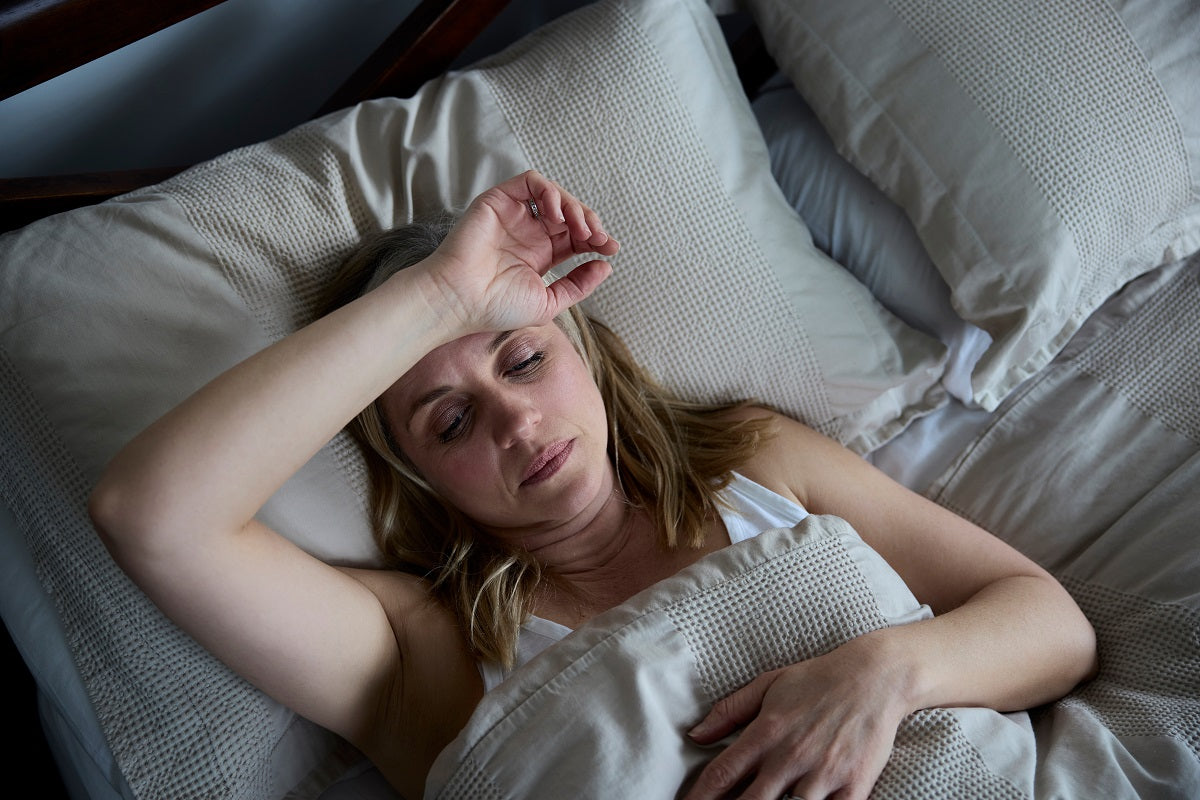Free U.S. Shipping On Orders Over $150

What Really Causes Night Sweats During Menopause?
Posted on
Night sweats during menopause are mostly due to hormonal changes. But other factors like the kind of bedding you are using, your diet and underlying health conditions can worsen the sweating and hot flashes.
How Changes in Hormones Makes You Sweat Buckets
Perimenopause and menopause are characterized primarily by a drop in the level of reproductive hormones, namely estrogen, progesterone and testosterone.
It’s this drop, especially in estrogen, that drives many of the symptoms associated with menopause, including night sweats and hot flashes.
Researchers are still not completely sure about the exact mechanism of menopausal hot flashes. All we know is that reduction in estrogen affects how the hypothalamus — the body’s thermostat in the brain — functions.
The hypothalamus senses that you are hotter than you actually are, which triggers an exaggerated heat dissipation reaction. Blood vessels dilate, making you suddenly feel hot in certain areas of the body like the face, neck and chest.
Heart rate also increases and you sweat more as the body attempts to cool you down.
Hot flashes can occur at any time. When they occur at night, we call them night sweats. You’ll wake up in the middle of the night feeling hot and sweaty.
Note that hormonal night sweats and hot flashes don't just occur during menopause. They can occur whenever there is a disruption in the normal levels of sex hormones. Many women get night sweats some time during their menstrual cycle, when they are pregnant, or when they get their ovaries surgically removed.
Night sweats can also be non-hormonal. Medications, certain diseases, alcohol, and anxiety can also trigger night sweats and hot flashes.
Things That Can Make Your Night Sweats Worse
Night sweats and hot flashes don't occur equally for every woman. They can be mild in some women and so severe in others to the point of being debilitating.
This disparity is because there are many factors that determine how bad your night sweats are. You want to avoid or reduce anything that worsens your hot flashes.
Poor Sleep
One of the main problems with hot flashes, other than the discomfort, is sleep disruption. Menopausal women often have to struggle with sleep deprivation and chronic insomnia.
It also works the other way round. Poor sleep quality increases the likelihood and severity of hot flashes.
That’s why it’s important to try and improve your sleep quality, despite the challenges of menopause. Have a regular sleep routine, switch to cooler and more breathable bedding like the Hercleon Jax sheets, and stay active during the day.
Obesity
The science is not fully conclusive on this yet, but it seems that obesity increases the risk of severe hot flashes in women.
Initially, researchers thought that obesity might have a mitigating effect on menopausal symptoms. That’s because fat cells absorb estrogen, which is later released into the blood. So they don't experience as big a drop in estrogen as women who weigh less.
But now, researchers think that the extra fat could actually worsen hot flashes. The fat acts as an insulator, trapping heat in the body. This makes you feel even hotter and causes more sweating.
Taking steps to lose weight can help reduce the severity and frequency of hot flashes. It can also help with other menopause-related issues like anxiety, fatigue and joint pain.
Heat-trapping Bedding
With your body producing more heat than usual, the last thing you need is bedding that traps that heat and makes you even hotter and sweatier.
We recommend upgrading to bedding and linens made with natural or semi-natural materials like bamboo, silk, Tencel, modal and linen.
These fabrics are breathable, meaning they don't trap heat and will help you stay cool. They also absorb sweat off your skin and dissipate it quickly.
Be careful with cotton bedding. While cotton sheets are breathable and absorb sweat, they tend to hold onto moisture and stay damp. We don't recommend cotton if you have serious night sweats.
In addition to linen, other upgrades you can make to sleep cooler include a more breathable mattress (latex and hybrid mattresses are excellent choices), a cooling mattress topper or pad (get one made from latex, down or wool), and a lightweight comforter. Our all-season Jax comforter is specifically designed to prevent overheating and deal with sweating.
Smoking and Alcohol
Smoking worsens symptoms of menopause. Smokers tend to experience hot flashes that are more severe and more frequent. They also worsen menopause-related anxiety, difficulty sleeping, and bone loss (smokers are more likely to break a hip after menopause).
Not only that, smoking can also make menopause occur earlier than usual.
Alcohol has a similar effect as smoking on menopausal women. It worsens symptoms and can make your hot flashes a lot more uncomfortable.
Alcohol also interferes with your sleep. We’ve already mentioned that poor sleep can make menopause harder on you. It also causes weight gain, another factor that worsens menopause symptoms.
Similar to smoking, alcohol compromises bone health and increases the risk of osteoporosis. This is particularly dangerous for menopausal women since the drop in estrogen is already bad for your bones and joints.
Final Thoughts
For many women, menopausal night sweats are inevitable. But they don't have to be as bad as you imagine. A healthier lifestyle with good sleep, less alcohol, no smoking and a healthy diet can make menopause a lot more comfortable.
Quick links
Contact
6063 Hudson Road #160
Woodbury, MN 55125
Yo@hercLeon.com
Leave a comment: